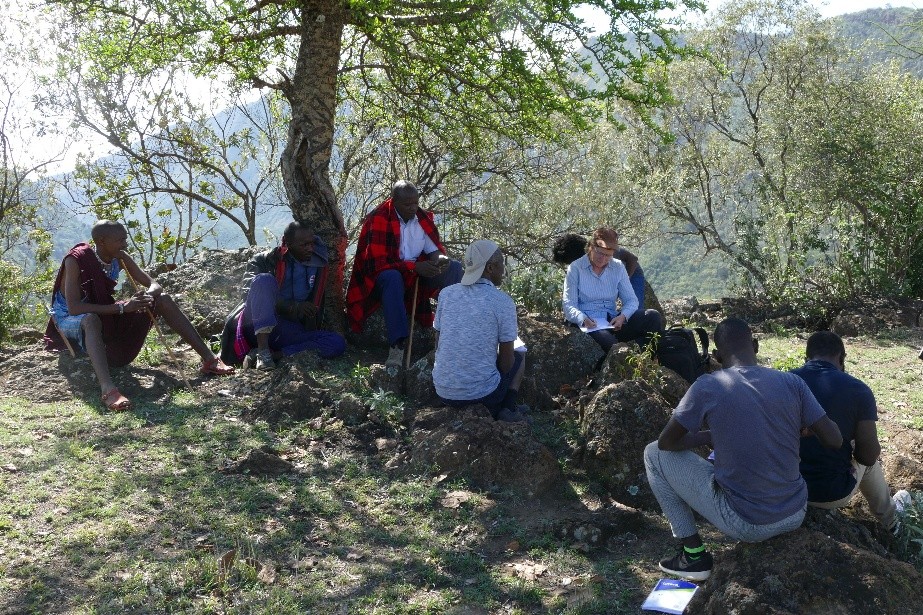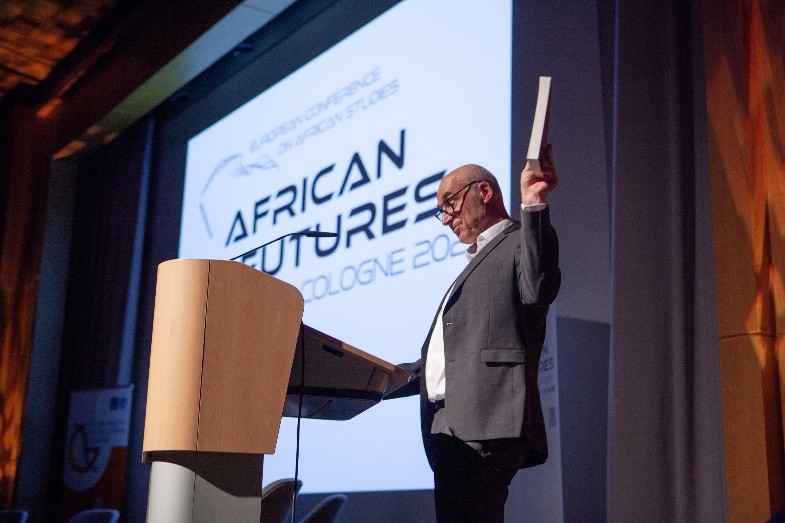At ECAS 2025 in Prague, Michael Bollig succeeded Amanda Hammar as AEGIS President, marking the official transfer of the presidency to the Global South Studies Center (GSSC) in Cologne.
The GSSC is the central hub of University of Cologne’s Key Profile Area Global South Studies. Founded in 2014, the GSSC brings together and coordinates research on Africa, Asia and Latin America from a wide range of social science and humanities perspectives. It engages in particular with cultural, social, economic, and ecological changes in the Global South, set against the background of multiple crises and planetary challenges A particular focus lies on human-environment relations. The current spokesperson is anthropologist Prof. Michaela Pelican.
Research at the GSSC
The GSSC has a broad research profile that includes researchers from numerous departments, institutes, research units and disciplines, such as the Institute of Geography, Department of Social and Cultural Anthropology, Department of History, Linguistics and Literary Studies, Regional Studies, Islamic Studies, Modern Chinese Studies, African Studies, and most recently African Archaeology. Research undertakings at the GSSC are framed by the center’s strong institutional ties with leading international research institutions, particularly in the Global South. The GSSC has a strong emphasis on interdisciplinarity and organizes its research around five thematic areas, each bridging theory, fieldwork, and collaboration:
-
Commoning: Visions, Resources, Practices
This area explores forms of commons, collective resource management, and community practices. Researchers investigate how communities share and manage resources—ecologically, socially, and culturally—and how these practices are envisioned and enacted. -
Co-Producing Knowledge
Focused on collaborative knowledge production, this field examines how researchers and local actors co-create insights. Participatory methods, transdisciplinary collaboration, and reflexive research practices are central. -
Infrastructures
Infrastructure is approached not only as a technical system but as a socio-political and ecological network, including transportation, water systems, digital technologies, and social connectivity. The work examines issues of access, inequality, and the political dimensions of infrastructural arrangements. -
South–South Relations: Engaging with New Constellations and Dynamics in the Global Souths
Moving beyond traditional North–South perspectives, this area investigates relations, dynamics, and collaborations within the Global South. It explores emerging alliances, knowledge flows, and decentralization processes across regions. -
Transregional Museum and Heritage Studies
Researchers study cultural heritage across regions, focusing on museums, memory practices, and the interplay between local, regional, and global identities. Thematic emphasis includes object histories, narrative formation, and the politics of representation.
Selected Africa-related Projects at the GSSC
Research conducted at the GSSC occurs within a framework of collaborative research alliances. Close networks between researchers representing diverse disciplines make optimal use of intellectual synergies, create innovative new research formats, and produce significant research results. GSSC researchers have applied successfully for third-party funding to support largescale cooperative projects, a selection of which you can find below:
The African Climate and Environment Center – Future African Savannas (AFAS) is a DAAD-funded global climate and environment initiative (2021–2030) in which GSSC-based researchers collaborate with partners from Nairobi University, Kenya and Université Félix-Houphouët-Boigny, Cote d’Ivoire. AFAS focuses on nature-based solutions for climate adaptation and biodiversity conservation in African savannas. Activities include virtual lecture series, workshops, stakeholder dialogues, and summer schools.
Funded by the European Research Council, this project examines human-animal-environment interactions in the Kavango-Zambezi Transboundary Conservation Area (KAZA) across Southern Africa. It explores multispecies assemblages—including elephants, lions, livestock, and pathogens—and how human and non-human interactions evolve together with researchers from Namibia, Botswana and Zambia.
The German Research Foundation (DFG) funded Collaborative Research Centre 228 – Future Rural Africa studies land-use change, socio-ecological transformations, and rural futures across Africa. The projects of the CRC analyse how different approaches to the future, and also surprises and unintended side-effects, inform the politics and practices of large-scale land-use change, and how they relate to each other. The project collaborates intensely with diverse Kenyan, Tanzanian, Namibian, Zambian, Botswanan and South African Universities.

Funded by the German Research Foundation (DFG), this newly established project is set to investigates the entanglement of sustainability and resilience in agri-food chains in times of multiple crises, once it is officially launched in early 2026.
Funded by the Volkswagen Foundation, this project examines the socio-economic roles, agricultural strategies, and sustainability practices of medium-scale farmers across African contexts in collaboration with the University of Ghana, Aga Khan University Arusha Climate and Environmental Research Centre, and the University of the Western Cape.
This project, funded by the German Research Foundation focusses on the forms and functions of group related empathy within the context of an Indigenous Community in northwest Namibia. The interaction between the phenomenlogical conceptualisation of relations between collective empathy and personal resilience on the one hand and participant observation based ethnography on the other hand constitutes the innovative core of the project.
This project investigates the impact of a globalized economy on untouched ‘wild’ nature. Through multidisciplinary research, it aims to deepen understanding of the ecological, social, and political dimensions of commodification.
This research unit, funded by the VW Foundation and led by GSSC spokesperson Michaela Pelican, focuses on concepts and actors and their roles in producing and reproducing social inequalities in the context of colonial and postcolonial labor systems and regimes of mobility in the Global South. Research is centrered around selected concepts that are locally grounded and describe forms of social inequalities linked to different types of labor exploitation, namely "native labor", "new slavery", "human trafficking", and "cheap/abundant labor".
A comparative project in Namibia and Vietnam examining the transition from fossil fuels to green hydrogen, focusing on energy, policy, and transformative development[MB2] , in cooperation with the Institute for Circular Economy Development (ICED) in Ho Chi Minh City.
This project explores how coastal heritage in West Africa can strengthen community resilience to climate change by engaging local communities in the preservation and management of cultural and natural heritage. Focusing on southern Bénin, it builds on long-term collaborations to integrate heritage conservation, sustainable tourism, and climate adaptation for inclusive and sustainable development.
Events and Academic Life
The GSSC hosts a vibrant series of events that foster knowledge exchange and public engagement:
- GSSC Seminar Series – Interdisciplinary seminars bringing together researchers from the Global South and Europe.
- GSSC Public Lecture – Talks open to broader audiences, highlighting cutting-edge research and policy debates.
- GSSC Focus Global South – In-depth thematic events designed for academics and the interested, general public, on pressing issues in African, Asian, and Latin American contexts.
- Workshops – Covering diverse topics from climate change to heritage studies, often in partnership with other centers, experts and local communities.
A particularly notable event was the European Conference on African Studies 2023 (ECAS 9), organized by the GSSC. More than 2000 researchers came to Cologne to participate in the conference under the theme African Futures; about 400 delegates joined from Africa.

AEGIS President Michael Bollig during the opening of ECAS 23 in Cologne.
In cooperation with the City of Cologne and a large number of NGOs and diasporic organizations, the GSSC hosted the public cultural program titled African Futures – All Around, simultaneously to the academic conference. Between May 30 and June 11, the city became a stage for over 100 events, including academic discussions, workshops, theater, dance, performance, film, music, and literature, thus opening the themes explored at ECAS 9 to the wider public. The program addressed shared challenges and future-oriented questions related to Africa and local communities in Cologne, reflecting on historical and (post)colonial legacies, fostering dialogue, mutual understanding, and collaboration.

ECAS 2023 in Cologne.
Looking Ahead
As the GSSC prepares to officially celebrate its 11th anniversary in December 2025—a number playfully significant to Cologne locals and carnival enthusiasts—the center reflects on over a decade of interdisciplinary and internationally engaged research. The GSSC exemplifies how such a hub can shape Global South Studies through thematic depth, collaborative projects, and dynamic public programming. Over the past eleven years, the GSSC has contributed significantly to knowledge production, established new paths in international institutional academic cooperation, policy debates, and cross-regional learning, while fostering dialogue between academia and wider communities. The excellence of research conducted by members of the GSSC is confirmed by renowned awards, prizes, and grants. Particularly noteworthy here, among others, two Leo-Spitzer Prices for academic excellence, the 2021 ERC Advanced Grant, the Heinz Maier-Leibnitz Prize 2019, the Leibniz Prize 2017 of the German Research Foundation (DFG), and the University Prize in the category “Research”.
